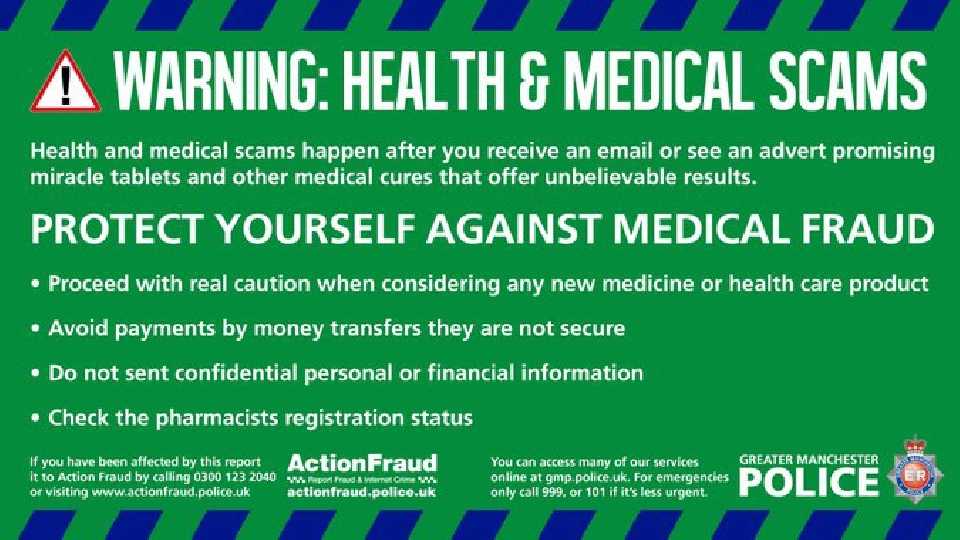GMP issues health and medical scam warning
Date published: 07 November 2020

It is a top priority for Greater Manchester Police to investigate reports of fraud thoroughly and take action to disrupt and stop fraudsters offending
The impact of fraud can be both financially and emotionally devastating.
It is a top priority for Greater Manchester Police (GMP) to investigate reports of fraud thoroughly and take action to disrupt and stop fraudsters offending.
GMP is committed to providing the public with up-to-date information about fraud and the latest scams so that our communities know how to protect themselves and their hard earned money, making it easier to stop these crimes taking place.
Health and medical scams - What is it?
A health or medical scam involves fraudsters selling products online which claim to prevent, treat or be a miracle cure for diseases or other health conditions.
Victims can be led to believe that they are receiving a product or service for a lower price however, often the produce received is not the real thing or of a high quality.
Fraudsters will also pose as fake online pharmacies, again offering drugs and medicines for a low price or without a prescription.
Not only are victims left out of pocket as they have paid for products which often aren't what they claim, but these scams can also have a detrimental impact on their health.
There is no way of knowing what the medicines brought online contain, therefore there is no way of knowing how they may effect existing health conditions, they may also trigger a damaging reaction which could cause serious or even fatal injuries and taking medicine brought online may lead to delays in getting a proper diagnosis and treatment.
What to look out for
Fraudulent health and medical websites often:
· Promise a new miracle cure or wonder breakthrough. But their products are neither tested, nor proven to work.
· Offer to supply prescription-only medicines without a valid prescription.
· Try to convince you with testimonials from satisfied customers. However, there is no way of knowing that these a genuine reviews and are no substitute for scientific evidence.
· Offer no risk money-back guarantees but, when you do try to get your money the fraudsters can't be contacted.
· Feature endorsements from a doctor or health professional quoting scientific evidence. If you look more closely however, you’ll see that these individuals are not affiliated to any known institution or clinical practice. Nor has their evidence been published in a recognised journal.
How to protect yourself
· Always talk to your GP or local pharmacist first. They’ll be able to tell you whether the product is safe and effective. If you’re managing a health condition, never stop taking a prescribed medicine, or start taking a new medicine, without consulting them first.
· Check the online pharmacy is legitimate. They should have a pharmacist's registration status and be connected to a genuine pharmacist at a genuine address.
· See whether you are asked questions – registered pharmacies are required to check that a medicine is suitable for a patient before selling it.
· Don't send your personal or financial information via email.
· Avoid paying for products online using money transfer as it isn't secure.
What to do if you think you have been a victim of health or medical fraud
· Report it to Action Fraud.
· If there’s a dispute over the nature of the product and its claimed benefits, you should attempt to contact the website selling the product for help and a refund.
· Keep all evidence of your purchase, including the goods you bought and any correspondence.
· If you’ve already made a payment, contact your credit card company and/or bank and tell them that you may have fallen victim to a fraud. They’ll advise you on cancelling payments and ensuring your finances remain secure.
· If you’ve already taken any medical products you are worried about, you should always visit your GP.
Detective Sergeant Stacey Shannon, of GMP’s Economic Crime Hub, said: “This is particularly cruel scam, as fraudsters are exploiting the vulnerability of those who may be seriously unwell and willing to pay a significant amount of money for a cure or treatment.
"However, in many cases the products that fraudsters are selling are not what they claim and at worse can have a detrimental effect on people's health.
"It is important that people always consult their GP or local pharmacist if thinking of changing their medication or buying medication online.
"As well as selling you a fake product, fraudsters will also try to gain personal and financial information from you during the transaction in order to try and steal your identity.
“If you think you or someone you know has been affected, report it to Action Fraud by calling 0300 123 2040 or visiting www.actionfraud.police.uk.”
Follow GMP's @gmpfraud Twitter account to stay up to date with the latest scam advice.
Do you have a story for us? Want to tell us about something going on in and around Oldham? Let us know by emailing news@oldham-chronicle.co.uk , calling our Oldham-based newsroom on 0161 633 2121 , tweeting us @oldhamchronicle or messaging us through our Facebook page. All contact will be treated in confidence.




